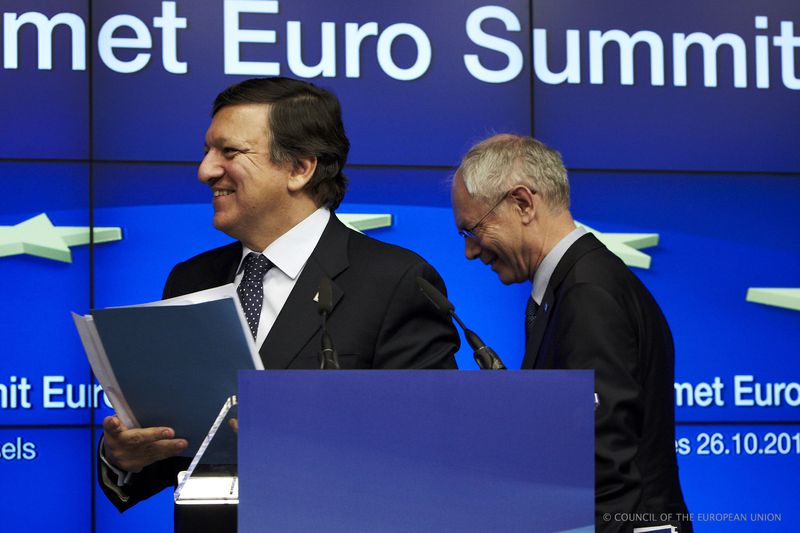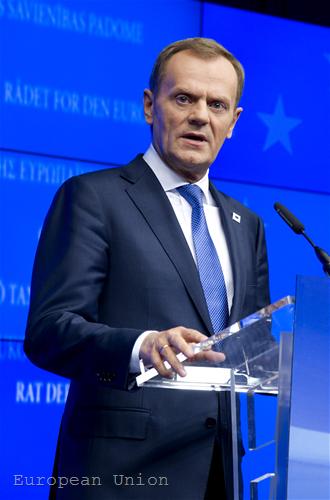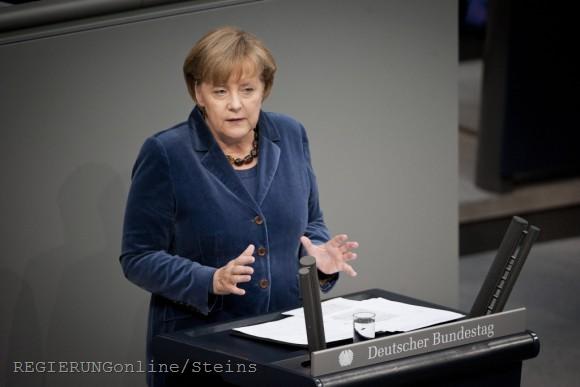A Sleepless Night and Fateful Decisions in Brussels
Ralitsa Kovacheva, October 27, 2011
 The summit of the euro area leaders was so loaded with expectations for fateful decisions that when these had been taken, even the leaders themselves seemed to be surprised.
The summit of the euro area leaders was so loaded with expectations for fateful decisions that when these had been taken, even the leaders themselves seemed to be surprised.
Greece
When the meeting continued to the wee hours of 27 October it became clear that the reason was the negotiations with the private sector to reduce the Greek debt. Among the journalists in Brussels a rumour spread that German Chancellor Angela Merkel, French President Nicolas Sarkozy, European Council President Herman Van Rompuy and IMF Director Christine Lagarde were involved in negotiations with the Institute of International Finance (IIF), which represented the private financial institutions in the negotiations on the Greek debt. The talks were held in parallel to the eurozone summit in a separate room in the Council building.
Shortly before 4 am local time there was a breakthrough when it  seemed that private banks would not yield to the politicians' request to accept 50% losses of the Greek bonds value. "We only have one offer to make and that was accepted," Angela Merkel said at the briefing after the summit. According to an official statement by the euro leaders, there will be "a voluntary bond exchange" which must be implemented in early 2012, but details are yet to be developed. According to a statement by IIF Director Charles Dallara, “the net present value of bondholders’ losses had not yet been determined" and negotiations should continue “to develop a concrete voluntary agreement”, the Financial Times wrote.
seemed that private banks would not yield to the politicians' request to accept 50% losses of the Greek bonds value. "We only have one offer to make and that was accepted," Angela Merkel said at the briefing after the summit. According to an official statement by the euro leaders, there will be "a voluntary bond exchange" which must be implemented in early 2012, but details are yet to be developed. According to a statement by IIF Director Charles Dallara, “the net present value of bondholders’ losses had not yet been determined" and negotiations should continue “to develop a concrete voluntary agreement”, the Financial Times wrote.
For their part, "the eurozone Member States would contribute to the PSI [Private Sector Involvement] package up to 30 bn euro," the statement said. According to Angela Merkel, as a result of the operation, the Greek debt would be reduced by about 100 billion euros.
 Additionally, the eurozone countries are ready to provide further assistance to Greece, worth 100 billion euros, based on a new programme that will be agreed by the end of the year. The German chancellor explained that because of the deteriorated situation in the country the price of the new loan would be significantly higher than the 109 billion euros agreed on 21 July - 163 billion euros, if there was no deal with private creditors.
Additionally, the eurozone countries are ready to provide further assistance to Greece, worth 100 billion euros, based on a new programme that will be agreed by the end of the year. The German chancellor explained that because of the deteriorated situation in the country the price of the new loan would be significantly higher than the 109 billion euros agreed on 21 July - 163 billion euros, if there was no deal with private creditors.
Greece, in turn, is obliged to implement additional measures, as there will be enhanced control over their implementation by the creditors. As Ms Merkel explained, instead of having missions every three months the Troika would have permanent presence in Athens, in order to monitor the actions of the Greek authorities. Greece has also committed to put back into the EFSF 15 billion euros raised through privatisation. The ultimate goal is, thanks to the deal with private creditors and the additional measures taken by the Greek Government, by the end of the decade the Greek debt to be reduced from the current 150% of GDP to 120% of GDP, which is considered a more sustainable level.
The rescue fund will dispose 1 trillion euros
As expected, the leaders endorsed two models to use more efficiently the rescue fund EFSF. The fund will offer to private investors risk insurance of new debt issued by euro area countries, thereby reducing the funding cost. At the same time, a parallel fund will be created (as a special purpose vehicle), which will combine "resources from private and public financial institutions and investors." Thanks to this the EFSF is expected to increase its financial capacity 4 to 5 times, approximately up to 1 trillion euros, but the amount depends on the specific conditions, as said in a statement by European Council President Herman Van Rompuy.
It is expected details of the implementation of both models to be finalised by the euro area finance ministers (the Eurogroup) in November. Brussels is hoping that some of the BRICS countries (Brazil, Russia, India, China and South Africa), as well as large private investors will be interested in such a joint venture with the euro area. Today, French President Nicolas Sarkozy is holding talks on the issue with Chinese President Hu Jintao. An option for possible greater IMF participation is also being discussed but the euro leaders are concise on the topic: "In addition, further enhancement of the EFSF resources can be achieved by cooperating even more closely with the IMF. The Eurogroup, the Commission and the EFSF will work on all possible options", the statement reads.
106 billion euros for banks
As euinside wrote, the leaders have agreed a common plan "for restoring confidence in the banking sector" which includes "facilitating access to term-funding" and creation of a temporary buffer by "requiring a significantly higher capital ratio of 9% of the highest quality capital" by the end of June 2012. According to the European Banking Authority (EBA) recapitalisation of banks will cost approximately 106 billion euros. EBA disseminated a country by country information on potential needs of the banking sector, noting that the final figures would be clear in November, as the EBA had not conducted a new round of stress tests but used the data from the stress-testing in June.
Greece needs 30 billion euros for bank recapitalisation, as the funds are provided in its second rescue programme. French banks, which are at risk because of their large exposures to peripheral economies debt, must raise nearly 9 billion euros capital buffer, and German banks need 5 billion euros, according to the EBA.
Spain
However, Spain seems to be most problematic, as its banks need a buffer of over  26 billion euros. This could become a severe hardship if state aid for banks is needed, given the difficult financial situation of the country and the strong market pressure in recent months. Recent data suggest that Madrid will probably not be able to reduce its deficit to 6% of GDP, as planned. This will significantly worsen its situation, although at this stage both the Spanish authorities and European institutions deny any possibility Spain to ask a bailout from the IMF and the EU. The statement of the euro leaders stresses that "strictly implementing budgetary adjustment as planned is key, including at regional level", and that Spain should take measures to promote growth and "to reduce the unacceptable high level of unemployment".
26 billion euros. This could become a severe hardship if state aid for banks is needed, given the difficult financial situation of the country and the strong market pressure in recent months. Recent data suggest that Madrid will probably not be able to reduce its deficit to 6% of GDP, as planned. This will significantly worsen its situation, although at this stage both the Spanish authorities and European institutions deny any possibility Spain to ask a bailout from the IMF and the EU. The statement of the euro leaders stresses that "strictly implementing budgetary adjustment as planned is key, including at regional level", and that Spain should take measures to promote growth and "to reduce the unacceptable high level of unemployment".
Italy
 There is a similar situation in Italy, whose banks need additional capital of nearly 15 billion euros, while the country is trying to impose budget constraints and reduce the deficit. Prime Minister Silvio Berlusconi has sent letters to the Presidents of the Commission and the Council, describing Rome's plans for fiscal consolidation and structural reforms. The leaders' statement, however, makes it clear that there are no deadlines for their implementation, so Italy is called "to present as a matter of urgency an ambitious timetable". Rome is committed to achieve a balanced budget by 2013 and reduce its debt to 113% of GDP in 2014.
There is a similar situation in Italy, whose banks need additional capital of nearly 15 billion euros, while the country is trying to impose budget constraints and reduce the deficit. Prime Minister Silvio Berlusconi has sent letters to the Presidents of the Commission and the Council, describing Rome's plans for fiscal consolidation and structural reforms. The leaders' statement, however, makes it clear that there are no deadlines for their implementation, so Italy is called "to present as a matter of urgency an ambitious timetable". Rome is committed to achieve a balanced budget by 2013 and reduce its debt to 113% of GDP in 2014.
Perhaps this decision was not a self-initiative of Rome, judging from the words  of German Chancellor Angela Merkel: "This was particularly important that Italy has agreed to reduce its debt by 2014 to 113 percent. This is a remarkable reduction, and I think this will be an important message." Leaders expect by the end of the year Rome to present a clear plan how it would fulfil the stated intention to increase the retirement age to 67 years by 2026. The Commission is invited to assess the proposed measures and to monitor their implementation.
of German Chancellor Angela Merkel: "This was particularly important that Italy has agreed to reduce its debt by 2014 to 113 percent. This is a remarkable reduction, and I think this will be an important message." Leaders expect by the end of the year Rome to present a clear plan how it would fulfil the stated intention to increase the retirement age to 67 years by 2026. The Commission is invited to assess the proposed measures and to monitor their implementation.
Many of the new rules to strengthen the economic governance of the euro area have also been cleared out with yesterday's decisions. More on this topic coming soon on euinside.eu.
 | © The Council of the European Union
| © The Council of the European Union | © European Union
| © European Union | © REGIERUNGonline/Steins
| © REGIERUNGonline/Steins Klaus Regling | © Council of the EU
Klaus Regling | © Council of the EU Mario Centeno | © Council of the EU
Mario Centeno | © Council of the EU Mario Centeno | © Council of the EU
Mario Centeno | © Council of the EU